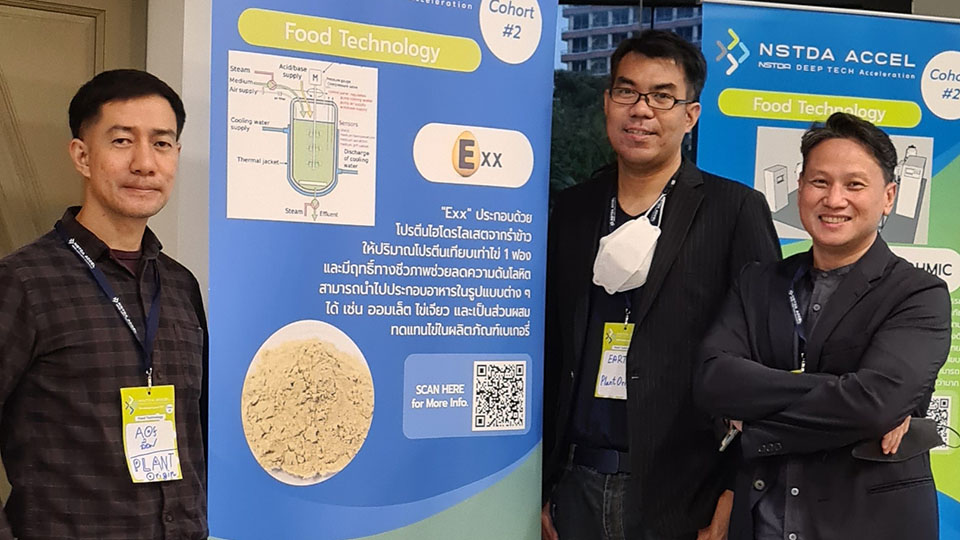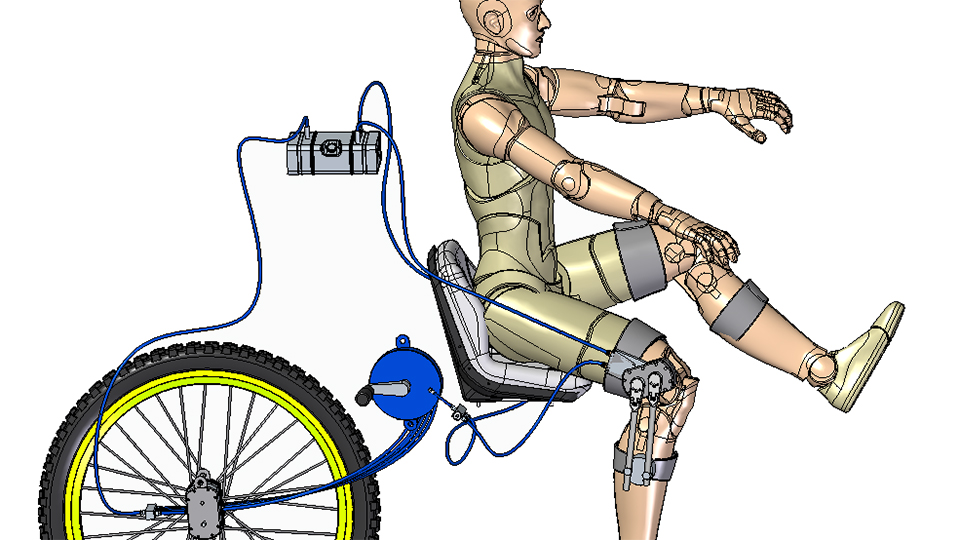Institute of Microbial Technology, India
Cardiovascular diseases are the number one cause of death worldwide, and according to the World Health Organization (WHO) represent nearly 30% of all global deaths. Of these, over 80% occur in low to middle income economies due to more risk factors and the lack of access to effective and affordable treatment options. This problem has afflicted the Republic of India (India) particularly hard, which accounts for nearly 60% of all heart disease cases worldwide. The overall mortality rate for heart attack (the most common result of cardiovascular disease) in the country has increased because of the unavailability of affordable thrombolytic drugs. These are among the most necessary medicines to treat heart attacks as they dissolve life threatening blood clots within six hours of a heart attack (known as the “golden window” period).

The severity of this problem in India has resulted in a swath of new projects at various Indian research organizations, one of which is the Council of Scientific and Industrial Research (CSIR) in New Delhi. CSIR was established in 1942 as an autonomous scientific and industrial research organization. By 2011, it had under its direction 39 state-of-the-art research laboratories and 50 extension centers, and is a leading internationally known research organization. One of these laboratories is the Institute of Microbial Technology (IMTECH), which was established in 1984 and is based in Chandigarh, the capital of the union territory of the states of Punjab and Harayana. In 1992, IMTECH launched a research program which resulted in the successful development of a novel and effective blood clot dissolver and the associated production process. The new technology is extremely affordable and without the major side effects (such as hemorrhaging) that generally come along with conventional medicine. These factors make it ideally suited for India and developing countries which are experiencing a dramatic increase in cardiovascular diseases.
Research and development
The two most conventional drugs used to rapidly dissolve blood clots after a heart attack are streptokinase (SK) and tissue plasminogen activator (TPA). SK is a protein that can be used as an effective and inexpensive clot-dissolving medication for heart attacks and targets all clots in general. TPA targets a specific clot and is thus more effective than SK, but it is ten times more expensive. SK is therefore used predominantly in low and middle income countries. Although SK is effective, it exhibits several damaging side effects, including an increased risk of intravascular bleeding and hemorrhage. IMTECH therefore recognized the need to develop a TPA-like medication that is affordable for even the poorest of patients.
Funded by CSIR and also partially by the Department of Biotechnology of the Government of India, research and development (R&D) started in 1992 and focused on creating a novel hybrid SK-based protein that would become active in a time delayed manner once it was in the vicinity of the target blood clot, and would also remain active for a longer period of time. Normal SK activates its properties almost immediately upon administration, but researchers worked to develop a hybrid drug that would not become active until it reached its target blood clot prior to attainment of its full effects. Researchers also focused on a number of other goals for the hybrid drug. First, SK molecules were selectively modified so the new drug would retain the desirable properties of unmodified SK. Second, different variants of the molecule would be developed to create more efficient dilution of blood clots with a reduced reaction from the immune system. Third, the new drug would ensure the stable degradation of the blood clot thus making the drug stable. Lastly, R&D also focused on developing a system for the production of the hybrid polypeptides (a chain of linked amino acids which form the building blocks of proteins), which includes DNA segments/polynucleotide blocks encoding the polypeptides, plasmids containing these genetic elements capable of their expression into protein, as well as micro-organisms transformed with these plasmids.
Invention
IMTECH's work culminated in the development of a new hybrid drug technology which does not target a specific clot, but instead uses time delay properties to activate when it is in the vicinity of the clot. The drug is essentially a mutant SK-based protein molecule that remains inactive for 5 to 30 minutes after administration. The molecule can achieve this because of a modified plasmin “activation switch” that it contains, which ensures that the molecule will activate inside the blood clot and not outside. Plasmin is a vital enzyme, and as such blood clots are rich in plasmins. Because plasmins are necessary for the molecule to activate, once it comes in contact with a blood clot rich in plasmins, the activation switch is turned on, and the molecule goes to work dissolving the blood clot.

Because of its hybrid nature it does not activate until it is within proximity of a blood clot like TPA-based drugs and thus has fewer side effects than traditional SK-based medicine, which stimulate plasmin production in the affected area but does not specifically target clots. It is also exceedingly more affordable than expensive TPA-based drugs that target only a specific clot. At the same time, the drug has enhanced effectiveness and is more stable, which makes it a more desirable choice over conventional drugs. Further improvements to the technology were made in 2009. In addition to the hybrid molecule, IMTECH invented a method for the selection and production of SK molecules that show increased stability, extended half-life (the time it takes a substance undergoing decay to decrease by half) and reduced immunogenicity (the ability of a particular substance to provoke an immune system response).
IP management
With its long history of developing innovative technologies, securing IP rights (IPRs) is an essential part of CSIR's activities. It therefore makes prodigious use of the IP system, and as such a strong IP management strategy is important to CSIR. In 1996, the organization developed and adopted its official IP management policy and became one of the earliest entities in India to do so. The goal of the policy is to maximize the benefits to CSIR from its intellectual capital by stimulating higher levels of innovation through a judicious system of rewards, ensuring timely and effective legal protection for its IP and leveraging and forging strategic alliances for enhancing the value of its IP. CSIR's IP achievements reflect the success of this policy, and since the mid 1990s it has emerged as a leader in IPRs covering all forms, including patents, trademarks, industrial designs, new plant varieties, and copyright, among others.
In the case of the hybrid SK molecule and production process, the results of the R&D were reported to the lab's IP cell, which drafted a report of the invention. This was sent to the IP Management Division (IPMD), which is a centralized division of CSIR that is responsible for IP protection of inventions developed at CSIR laboratories. Once in the hands of IPMD, an international patent information search was carried out and the decision was made to draft and submit a national patent application.
Patents
Prior to the development of the hybrid SK, CSIR-IMTECH scientists had developed a process technology for the preparation of natural streptokinase, thus bringing down its price by nearly half in the Indian market. This product was licensed to Cadila and is already available in the Indian market under the STpase brand name.
Furthermore, after the introduction of natural streptokinase in the market in 2001, the research team, headed by Dr. Sahni, developed a recombinant version of natural streptokinase that is roughly ten times as efficient as a natural SK. This technological package was licensed to M/S Shasun Chemicals & Drug Ltd., Chennai, from 2002-2003. This product was launched in the Indian markets in July 2009 under the brand names “Lupiflo” and “Klotbuster”.
After developing and sufficiently testing the invention relating to the hybrid SK up to 1998, that same year CSIR filed national patent applications for the new SK hybrid molecule (#159/DEL/2003) and its production process (#3825/DEL/1998) with the Controller General of Patents Designs and Trademarks of the Government of India (IP India), which were granted along with divisional patents in 2005 and 2010, respectively. Foreign applications for the hybrid SK molecule were filed in 1999 in countries such as France and the United Kingdom through an application with the European Patent Office (EPO), and in the USA with the United States Patent and Trademark Office (USPTO). An international application for an improved process covering the mutants of SK and their covalently modified forms was also made in 2009 in India through the Patent Cooperation Treaty (PCT) system. Subsequent patent applications were also made for the improved process in other countries that were not members of the PCT system.
The hybrid SK molecule and its improvement are just one of the many examples of CSIR's efforts to secure IPRs. As of early 2012, CSIR's patent portfolio consisted of over 2,750 granted foreign patents and over 1,850 Indian patents. In addition, the organization has over 1,800 patent applications pending in India and over 1,600 pending foreign applications. CSIR holds a reasonable share of patents granted to Indians organizations, individuals, and assignees in the USA and accounts for more than 90% of USA patents granted to publicly funded R&D and academic institutions in India. In 2002 CSIR helped India become the leading filer of patent applications under the PCT system, and continues to be one of the world's major PCT filers.

Licensing and commercialization
With IP protection in hand, CSIR used its extensive experience and resources to take a quick and successful path to commercialization. Because of the R&D nature of the organization, it determined that the best way in which to transfer the technology to the commercial sector was through licensing agreements. CSIR therefore launched a series of networking and promotion activities, through which contact was made with interested parties for domestic and international licensing.
Negotiations for a worldwide licensee lasted approximately one year, and in 2006 CSIR entered into an exclusive worldwide licensing agreement with Nostrum Pharma Inc., (Nostrum Pharma), an established pharmaceutical based in the USA, for the hybrid SK molecule and the production process. The technology was exclusively and globally licensed to Nostrum Pharma for US $5 million, plus additional royalties which will be determined once the technology has been commercialized.
Because Nostrum Pharma was the worldwide licensee of this technology, it had the right to also be the first worldwide licensee for any improvements. As IMTECH developed improvements to the technology in 2009, in 2010 the company therefore exclusively licensed the patent to Nostrum Pharma for these improvements for approximately US $150 million, which includes upfront compensation, milestone payments, expected royalties subject to successful completion of clinical trials at various phases, fees to obtain regulatory approvals before the product goes to the market, and accrual of royalties on commercialization Nostrum Pharma is responsible for all costs related to further R&D, toxicological studies, clinical trials and further IP protection.
The choice of Nostrum Pharma as the worldwide licensee was strategic for a number of reasons, but primarily because it has extensive experience in the formulation and commercialization of specialty pharmaceutical products and controlled-release, orally administered branded and generic drugs. Controlled-release drug delivery technology has significant improvements, perhaps the most important of which is patient friendly dosage amounts. This allows a reduction in the frequency of drug administration, thus making it easier for patients to keep up with their medicine. This type of medicine is especially beneficial for certain patients such as the elderly, as they are often required to take several different medications with different dosages in a single day. In addition, the company has the resources and expertise with which to undertake further R&D, clinical trials and testing, all of which are necessary for commercialization. Because IMTECH's goal is to commercialize the invention into an easily administrable drug with few side effects, Nostrum Pharma's expertise made it an attractive global licensee.
As of early 2012 Nostrum Pharma is undertaking detailed toxicological studies in primates and other animals. These studies have been extremely successful, and have shown that the technology has virtually none of the side effects that are associated with traditional drugs, namely hemorrhaging. Building on this success, the company is gearing up to commence clinical trials, which will last approximately two years. After this, Nostrum Pharma will seek approval from the Federal and Drug Administration (FDA) of the USA. Once these steps are successfully completed, the company will be in a position to commercialize the technology worldwide.
Public health
The development of hybrid SK technology has far reaching implications for health in developing countries. According to the WHO, in 2010 cardiovascular diseases became the leading cause of death in developing countries. While the risk factors are increasing, access to effective and affordable medicine is decreasing, and many people are not able to divert their scarce resources to medical care. Because the diseases affect many people in their peak mid life years, the futures of entire families are put into question and national development is at risk because of a decrease in valuable human resources. Access to affordable drugs such as hybrid SK technology will therefore increase the health and quality of life of those in need, but also help in the economic and social development of a country.

Business results
Market demand for thrombolytic agents in India is more than 1 billion Indian Rupees (Rs.), out of which the demand for SK represents 80%, with the demand growing 25% annually. The introduction of the recombinant natural SK technology into the Indian market has already been a resounding success. Demand has continually increased, people have more access to affordable medicines, and production has been ramped up.
Although the new hybrid SK technology has yet to be commercialized globally as of early 2012, licensing of the IP with Nostrum Pharma has been successful and has already brought in concrete results for CSIR. A significant portion of the upfront and milestone payments of the licensing agreements has been reinvested in further R&D on fourth generation clot dissolving medication. In addition, the funds have also allowed CSIR to construct additional bio-incubator facilities to be used in the development of these technologies. Once successfully developed and marketed, the new technology has the opportunity to not only save lives, but also become a commercial success throughout the world, particularly in developing countries.
A license for health
Through R&D and efficacious use of the IP system, CSIR was able to successfully license a technology that has the potential to bring an affordable, life saving drug to people throughout the world. Strong domestic results have given patients in India an affordable solution to a serious health problem. Promising results of early stage testing in 2011 means that Nostrum Pharma is poised to meet the massive worldwide demand for such a drug, and continues to work with CSIR to ensure not only the drug's success, but also that people in developing countries will have access to a desperately needed medicine and higher quality of life.



